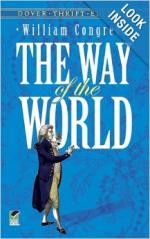
|
Prologue
• The Prologue makes a statement comparing two different types of fools: poets and natural fools.
• Poets are fools because they depend on the tastes and whims of other people to earn their living.
• Natural fools are stupid people who are blessed by fortune (fate).
• Congreve classified himself as a 'passive' poet who will accept the audience's opinion of this play instead of relying on his past success.
• Congreve states the purpose of the play is to entertain and not instruct the very knowledgeable audience.
• Prologues were a normal feature in Reformation theater.
• The prologue allows Congreve to defend his decision to add some unusual and new elements to his play.
• The play challenges the audience to try something new.
• Congreve wants them to use their 'reformed' sensibilities to enjoy something more subtle than farce which they had previously been used to.
Act 1, Scene 1
• Set in a chocolate...
|
This section contains 1,522 words (approx. 6 pages at 300 words per page) |

|




